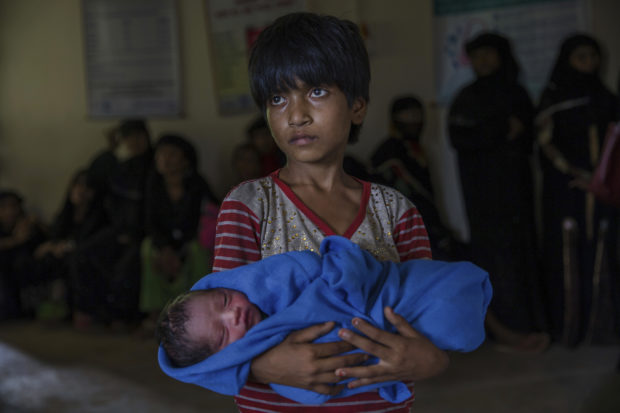
Rohingya Muslim girl Afeefa Bebi, who recently crossed over from Myanmar into Bangladesh, holds her few-hours-old brother as doctors check her mother Yasmeen Ara at a community hospital in Kutupalong refugee camp, Bangladesh, Wednesday, Sept. 13, 2017. The family crossed into Bangladesh on Sept. 3. (AP Photo/Dar Yasin)
COX’S BAZAR, Bangladesh — Nearly three weeks into a mass exodus of Rohingya fleeing violence in Myanmar, thousands were still flooding across the border Thursday in search of help and safety in teeming refugee settlements in Bangladesh.
The crisis has drawn global condemnation, with U.N. officials demanding that Myanmar halt what they described as a campaign of ethnic cleansing against the Muslim minority in Rakhine state.
Those who arrived Wednesday in wooden boats to beaches near Shah Puri Dwip fishing village described ongoing violence on the Myanmar side, where smoke could be seen billowing from a burning village — suggesting more Rohingya homes had been set alight.
One Rohingya man said his village of Rashidong had been attacked by Myanmar soldiers and police.
“When military and police surrounded our village and attacked us with rocket launchers to set fire, we got away from our village and fled away to any direction we could manage,” Abdul Goffar said.
Meanwhile, aid agencies were struggling to provide aid to everyone in need.
Scenes of panic erupted Thursday along roadsides where local volunteers were distributing food, water and other supplies haphazardly from parked vehicles. Local officials shouted through bullhorns for volunteers to coordinate their efforts with aid agencies to avoid spreading chaos.
Newly arrived Rohingya wait for their turn to collect building material for their shelters distributed by aid agencies in Kutupalong refugee camp, Bangladesh, Wednesday, Sept. 13, 2017. With Rohingya refugees still flooding across the border from Myanmar, those packed into camps and makeshift settlements in Bangladesh were becoming desperate for scant basic resources as hunger and illness soared. (AP Photo/Dar Yasin)
“There are acute shortages of everything, most critically shelter, food and clean water,” UNICEF’s country representative Edouard Beigbeder said.
The U.N. children’s agency says it needs $7.3 million to help just the hundreds of thousands of Rohingya children now at high risk of contracting water-borne diseases.
Two existing refugee camps were packed beyond capacity, and Banalgadesh said it would free land to build a third.
Many of the new arrivals were huddling in makeshift shelters along roads or in open fields. Near the camp of Balukhali, some were setting up tents made of bamboo and plastic along hillsides muddy from days of rain.
Children walked uphill to capture rainwater before it spilled into the teeming settlements below.
Bangladesh already was housing some 500,000 Rohingya who fled earlier flashes of violence including anti-Muslim riots in 2012.
Newly arrived Rohingya women along with their children rest inside a health complex run by aid agencies in Kutupalong refugee camp, Bangladesh, Wednesday, Sept. 13, 2017. (AP Photo/Dar Yasin)